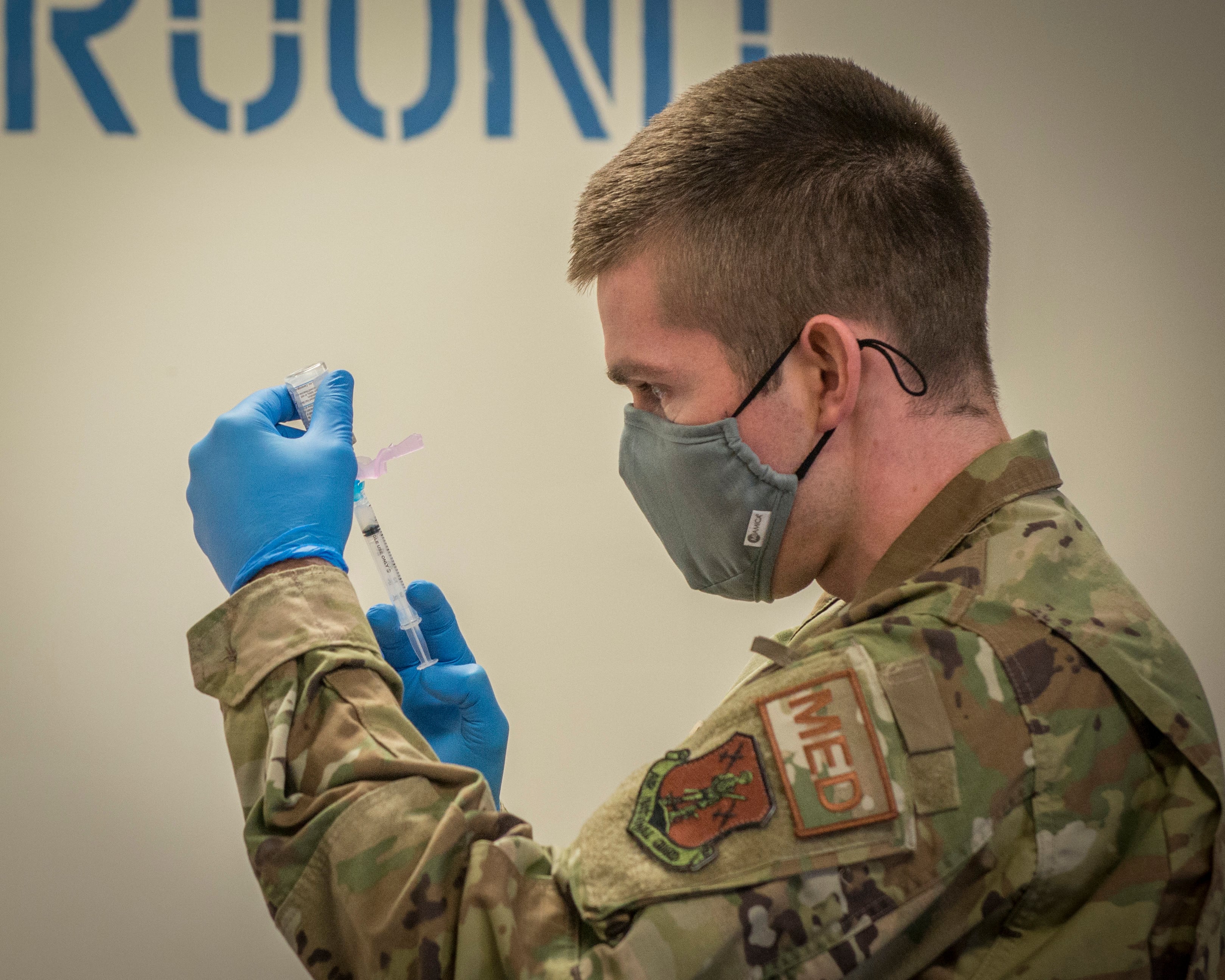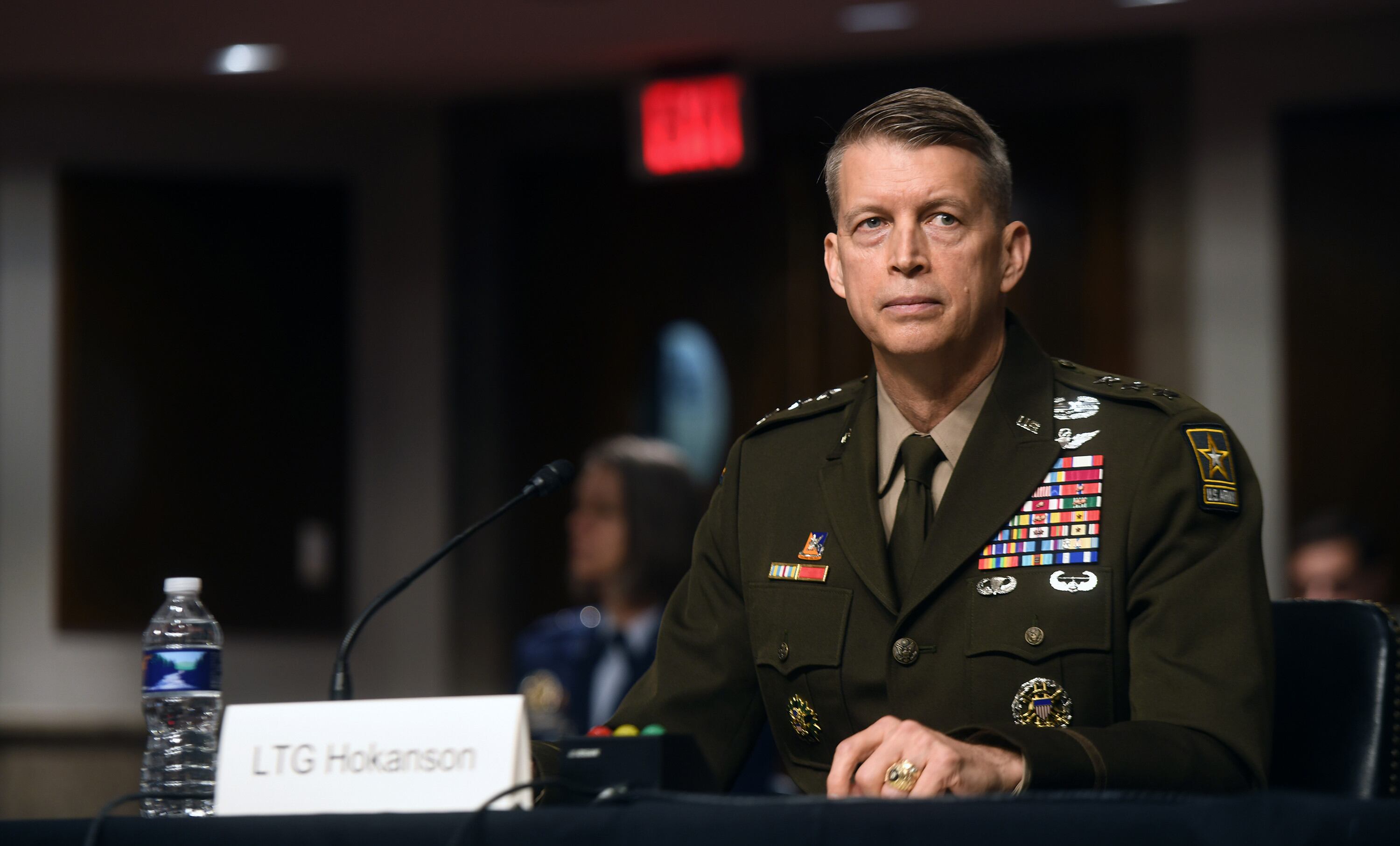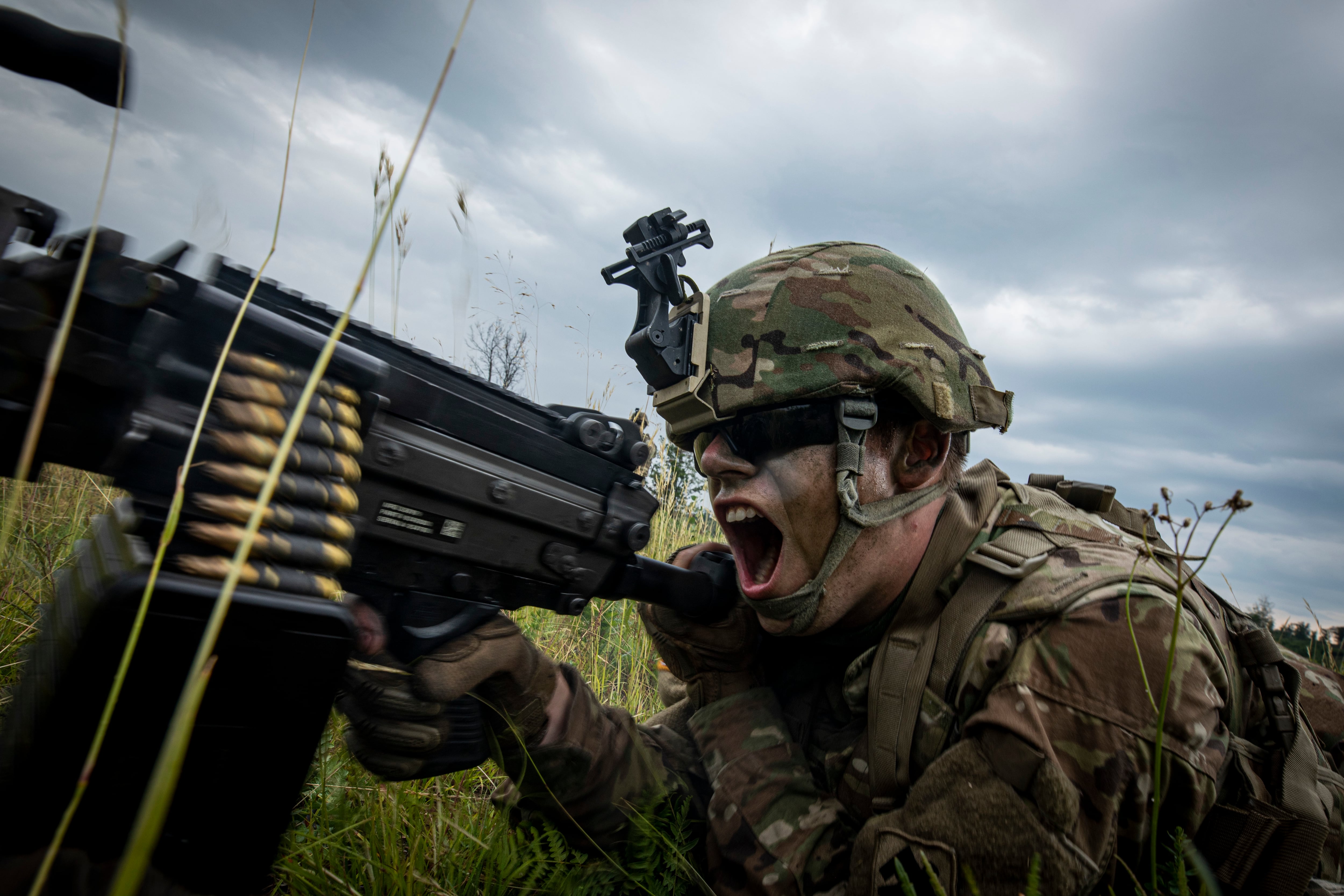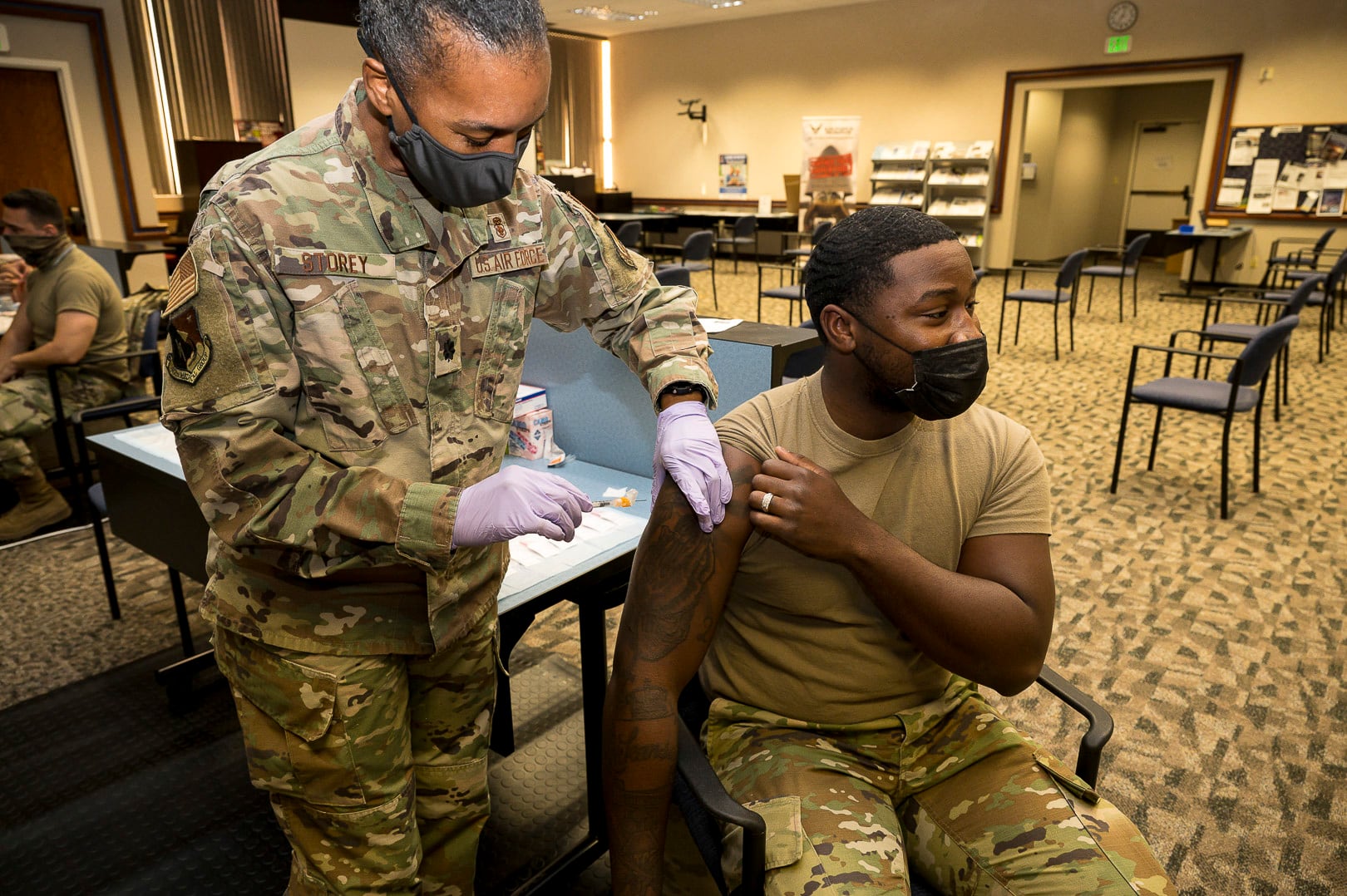The Air Force on Wednesday released its plan for kicking out airmen and guardians who refuse to get fully vaccinated against the coronavirus, saying anyone without an exemption is subject to discharge.
The service faces losing or reassigning nearly 23,000 members who have not complied with the public health mandate directed by Defense Secretary Lloyd Austin earlier this year.
“COVID-19 poses a direct risk to the health, safety and readiness of the force,” Air Force Secretary Frank Kendall said in a Tuesday memo. “Vaccination against COVID-19 is an essential military readiness requirement for all components of the Air Force and Space Force to ensure we maintain a healthy force.”
RELATED

About 95% of airmen and guardians are fully vaccinated against the coronavirus, following the Nov. 2 deadline for active duty members and Dec. 2 deadline for those in the Air Force Reserve and Air National Guard to get the shots.
People are considered fully vaccinated two weeks after receiving a single Johnson & Johnson shot or the second shot in a two-dose Moderna or Pfizer regimen.
More than 18,000 uniformed personnel are either awaiting a decision on a religious exemption request, have explicitly refused the shot or have otherwise not started the inoculation process. Nearly 4,800 people secured medical or administrative waivers as of 2 p.m. Monday. No religious accommodations have been approved.
Airmen and guardians whose requests for a medical, religious or administrative exemption are denied have five calendar days after being turned down to start the vaccination process, contest the decision or ask to leave the service, the Air Force said. That applies to troops on active duty and members of the Guard and Reserve.
RELATED

If the final appeal is denied, too, the five-day clock starts again. Active duty airmen and Title 32 Guardsmen who want to get out must leave by April 1, or no later than the beginning of the fifth month after their last appeal is rejected — for example, departing by May 1 following a Dec. 8 denial.
“Service members who continue to refuse to obey a lawful order to receive the COVID-19 vaccine after their exemption request/final appeal has been denied, or retirement/separation has not been approved, will be subject to administrative discharge,” the Air Force said.
Troops waiting to hear whether they can separate or retire may be exempted from the vaccination requirement until they leave the service. Those who are kicked out because they refuse the shots are ineligible for involuntary separation pay and may need to return unearned special pay like bonuses.
Airmen are already losing their jobs as the military works through its backlog of vaccine resisters.
A unverified copy of Holloman Air Force Base’s “Court Reporter” publication circulated on social media Wednesday listed one airman, three airmen first class and two senior airmen who were discharged in November after failing to comply with multiple orders to get the vaccine.
RELATED

Unvaccinated members of the Air National Guard and Air Force Reserve have a slightly different path forward.
Without the jab, Guardsmen are now banned from serving under Title 32 activation orders. Title 32 of the U.S. Code is a federally funded, state-controlled status and covers mandatory monthly drill and yearly training requirements. Without them, a Guardsman can’t continue to serve.
If they aren’t exempt and haven’t started working toward full vaccination by Dec. 31, they are blocked from participating in drills, training or other Title 32 duties. They also cannot be activated for duties, such as overseas deployments, under Title 10, which are under federal control and funding.
“Those with a remaining military service obligation will be involuntarily assigned to the Individual Ready Reserve,” the Air Force memo said. “Active Guard and Reserve members may be able to retire if they begin terminal leave status no later than 60 calendar days” after their exemption or appeal is denied.
Reservists who remain unprotected by a vaccine and aren’t going through the exemption process are “potentially in violation of the Uniform Code of Military Justice by refusing to obey a lawful order,” Kendall’s memo said. “Commanders should use their discretion as appropriate when initiating disciplinary action.”
Traditional Reservists, who are supposed to serve in one job for about two weeks a year, and individual mobilization augmentees, who temporarily join a unit or outside agency in need of personnel, will be moved to the Individual Ready Reserve without pay or points toward retirement if they are neither vaccinated nor exempt. The IRR program is an option for people who cut their military service short before their commitment is done, and mobilize on active duty as national emergencies arise.
“Active Guard and Reserve members who fail to be vaccinated and have not submitted an exemption or accommodation will have their … tour curtailed and involuntarily reassigned to the IRR,” the memo added.
RELATED

Traditional Reservists and individual mobilization augmentees can ask to retire by June 1, the memo said. Their pay and points would be withheld within 60 days of their exemption denial or appeal notice.
Reservists and Guardsmen must get their shots immediately after their exemption or appeal is turned down, and may be punished under military code or involuntarily reassigned to the IRR.
It’s unclear how many airmen and guardians have already been ousted from the Air Force and Space Force after the mandatory vaccination deadlines passed, or how many put in a request to leave because of the mandate.
The Department of the Air Force has recorded nearly 77,800 COVID-19 cases among its military and civilian employees, contractors and their dependents during the pandemic so far. Another five civilians died in the past week, bringing the department’s coronavirus-related death toll to 147.
The Biden administration hasn’t provided civilian vaccination data for each of the armed forces despite a Nov. 22 inoculation deadline.
RELATED

About 76 percent of Americans age 5 and older have gotten at least one shot, as the U.S. surpasses 49,300,000 COVID-19 cases.
The Food and Drug Administration deemed multiple vaccines safe and effective after clinical trials with tens of thousands of participants. Pfizer’s was fully approved for Americans age 16 and older, while Moderna and Johnson & Johnson’s versions are allowed in a provisional, emergency status.
Vaccines do not offer failproof protection against the virus but significantly decrease the likelihood of severe symptoms and death, according to the Centers for Disease Control and Prevention.
Nearly 789,000 Americans have died from COVID-19 as the pandemic enters its third year.
Rachel Cohen is the editor of Air Force Times. She joined the publication as its senior reporter in March 2021. Her work has appeared in the Washington Post, the Frederick News-Post (Md.), Air and Space Forces Magazine, Inside Defense, Inside Health Policy and elsewhere.









